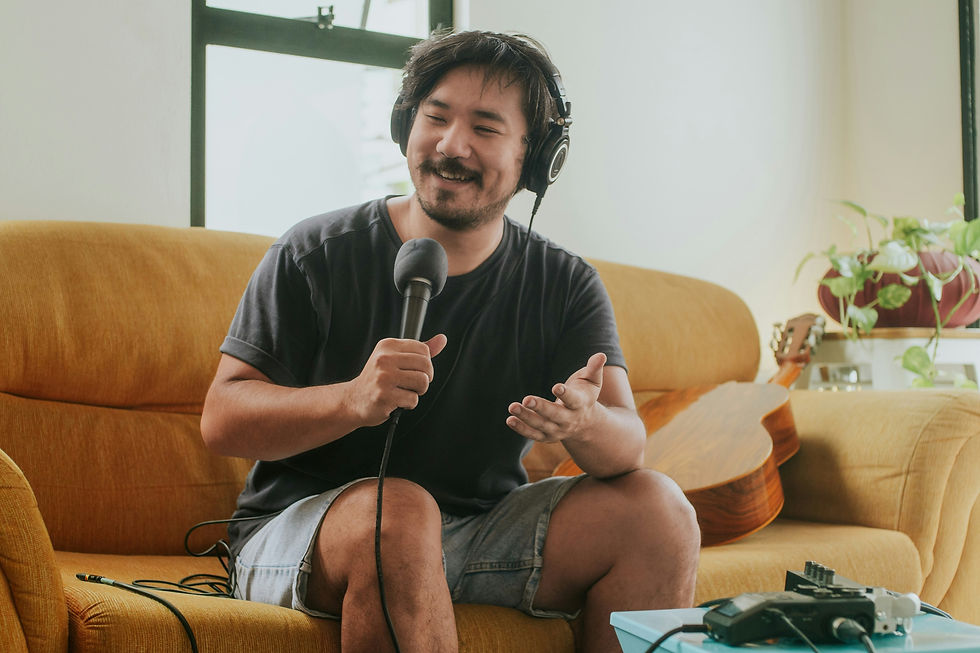Why Most Podcasts Fail (And How to Make Sure Yours Doesn’t)
- Brendan Smith

- Feb 25, 2025
- 3 min read

The podcasting world is more competitive than ever. Every day, new shows launch - and every day, countless podcasts quietly disappear.
The harsh reality? Most podcasts fail within the first 10 episodes.
Why? It’s not because the hosts aren’t passionate or their content isn’t good. It’s because they don’t have a clear plan to keep going.
So, how do you make sure your podcast doesn’t become another abandoned project? In this post, we’ll break down the biggest reasons podcasts fail - and how to make sure yours thrives.
1. No Clear Audience = No Growth
A podcast that’s for everyone is really for no one. If you’re trying to appeal to everyone on the internet, you’ll struggle to build a dedicated audience.
How to Fix It:
✅ Define your niche. Instead of a general “self-improvement” podcast, try “Self-Improvement for Creatives” or “Productivity Hacks for Entrepreneurs.”✅ Think about who you’re talking to. What are their interests? What problems do they have?✅ Make each episode feel tailored to them. If your audience feels like your podcast is made for them, they’ll keep coming back.
💡 Pro Tip: Podcasts with a clearly defined niche tend to grow faster because they stand out.
2. Poor Audio Quality = Instant Turnoff
You could have the best insights, the funniest takes, or the most inspiring stories, but if your audio is bad, listeners won’t stick around.
Nobody wants to strain their ears through crackly, echoey, or unbalanced audio.
How to Fix It:
✅ Use a real microphone. A budget USB mic (like the Blue Yeti or ATR2100x) is miles better than your laptop mic.✅ Record in a quiet, non-echoey space. Small rooms with carpets and soft surfaces work best.✅ Edit & clean up your audio. Remove background noise, balance levels, and add light compression to make voices sound clearer.
🎙️ Need help with audio editing? Musa Audio offers podcast production services starting at just $49.
3. No Promotion = No Listeners
A lot of new podcasters think:
“If I make a great podcast, people will find it.”
Unfortunately, that’s not how it works.
If you’re not actively sharing and promoting your podcast, nobody is going to know it exists.
How to Fix It:
✅ Post short video clips from your episodes on Instagram Reels, TikTok, and YouTube Shorts.✅ Join communities related to your niche (Reddit, Facebook groups, Twitter threads) and engage with potential listeners.✅ Get your guests to share the episode. Make it as easy as possible for them by providing a pre-written post or promo clip.
💡 Pro Tip: The most successful podcasts spend as much time promoting as they do recording.
4. Inconsistent Upload Schedule = No Loyalty
Listeners need consistency. If you drop random episodes at unpredictable times, they won’t build a habit of listening to your show.
How to Fix It:
✅ Pick a schedule and stick to it—weekly, biweekly, or monthly, but keep it predictable.✅ Batch record episodes in advance so you’re not scrambling to release content.✅ If you need a break, communicate it. Let listeners know when you’ll be back.
💡 Pro Tip: Podcasts that release episodes on a consistent schedule grow faster than ones with irregular uploads.
5. Giving Up Too Early = No Chance to Succeed
Most podcasts don’t fail because they’re bad. They fail because the creators quit before they see results.
Podcasting is a long game. Your first few episodes probably won’t go viral. You won’t hit thousands of downloads overnight. But if you stay consistent and keep improving, your audience will grow.
How to Fix It:
✅ Set a realistic goal. Commit to at least 20 episodes before you evaluate success.✅ Track progress, not just downloads. Are more people following you? Are listeners engaging?✅ Remember why you started. Stay focused on your passion, not just the numbers.
💡 Pro Tip: Some of the biggest podcasts today had tiny audiences for months or even years before they took off.
🎙️ Ready to Make Your Podcast a Success?
Podcasting isn’t just about starting - it’s about sticking with it and improving along the way.
If you want better audio, an easier editing process, or help with promotion, Musa Audio is here to help.
✅ Podcast Editing from $49✅ Noise Reduction, Mixing, & Mastering✅ Affordable, Studio-Quality Sound







Comments